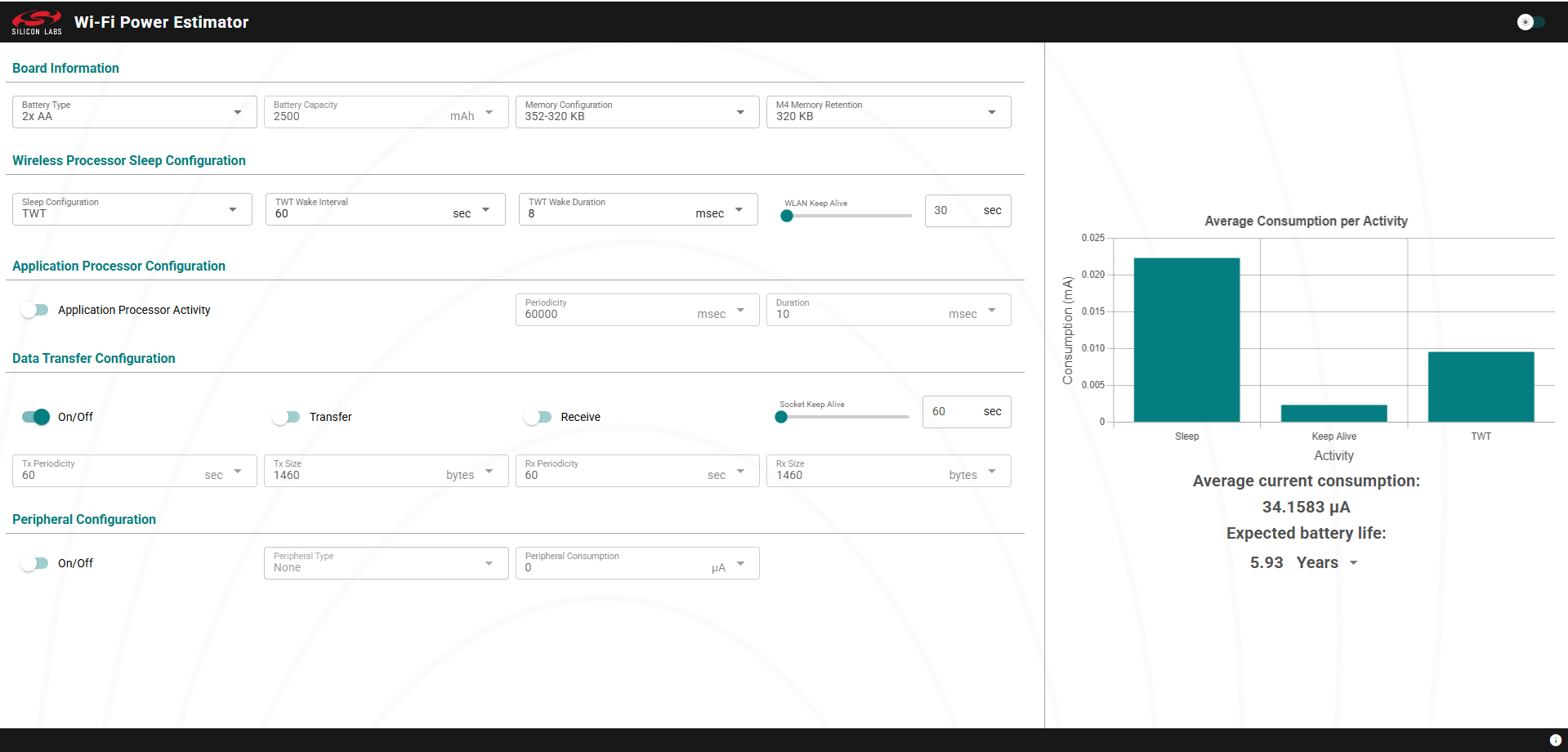Wi-Fi Power Estimator Tool: User Guide#


1. Overview#
The Wi-Fi Power Estimator is a specialized analysis tool integrated with Simplicity Studio v6 and compatible with Simplicity Studio v5. The estimator is designed to help developers estimate the power consumption of devices based on Silicon Lab's Wi-Fi 917 SoC series. By using static, datasheet-derived values, the tool facilitates early-stage power profiling that enables preliminary system-level power budget assessments without requiring physical measurements or live testing environments.
2. System Requirements#
To use the Wi-Fi Power Estimator tool, ensure the following requirements are met:
Software: Simplicity Studio v6 or Simplicity Studio v5
Internet Access: Required only if accessing the estimator through a web browser
3. Installation#
The tool is available through two access points:
Simplicity Studio v6:
Launch SLT Installer.
Open Package Manager.
Find "Wi-Fi Power Estimator" and click Install.
Simplicity Studio v5:
Launch Studio v5.
Open the Install menu.
Locate "Wi-Fi Power Estimator" in the Tools Tab and click Install.
4. Functional Description#
The estimator enables developers to simulate various operating scenarios by configuring parameters that reflect real-world application use cases. The computed output includes average current and battery lifetime statistics.
5. Input Configuration Parameters#
Battery Type: Choose between default profiles or custom. "Custom..." selection enables the Battery capacity input field.
Memory Configuration:
Network Wireless Processor (NWP) and M4 memory allocation (total 672 KB SRAM)
M4 memory retention during sleep (maximum depends on configuration)
Wireless Processor Sleep Configuration:
Sleep Config Mode: Target Wake Time (TWT), Unassociated (Not connected), Associated (Connected)
TWT Wake Interval: Frequency of wake-up in TWT mode (Legacy)
TWT Wake Duration: Time spent awake before returning to sleep
Unassociated Wake Periodicity: Frequency of network scans
Associated Listen Interval: How often the device listens for Wi-Fi frames
WLAN Keep-Alive: Periodicity of keep-alive packets (valid for TWT and Associated only)
Application Processor Configuration:
Enable or disable M4 processor
M4 Wake Periodicity: Interval for M4 wake without NWP
M4 Awake Duration: Duration M4 remains active independently
Data Transfer Configuration:
Enable or disable data transmission
Socket Keep-Alive: Interval for TCP keep-alive messages
TX Periodicity: Frequency of data sending via TCP
TX Size: Amount of data sent in each TX operation
RX Periodicity: Frequency of receiving data via TCP
RX Size: Amount of data received in each RX operation
Peripheral Configuration:
Enable or disable peripheral simulation
Choose predefined peripherals (for example, humidity and temperature sensor or LCD display) or custom.
Define custom peripherals by specifying power consumption manually
6. Output Metrics#
The tool computes the following metrics in real time:
Estimated current consumption based on provided input data
Battery life in the chosen metric
Average current consumption of different activities (visualized on a diagram)
7. Use Cases#
The estimator supports evaluating scenarios such as:
Periodic sensor data uploads over Wi-Fi
Power consumption comparison when migrating from competitor solutions
Standby power estimates for connected IoT devices
8. Limitations#
Estimates are derived strictly from static data sheet parameters.
Environmental influences and hardware variations (for example, temperature or impedance mismatch) are not modeled.
The tool does not support runtime power profiling.
